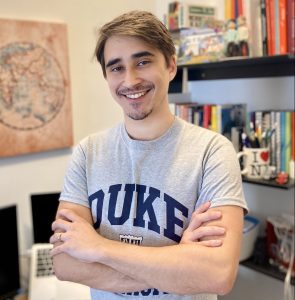B.S. Food Engineering, University of Viçosa (Brazil)
Minor Biotechnology, University of Lorraine (France)
M.S. Genetics and Molecular Biology, University of Campinas (Brazil)
Marco was born in Brazil, lived one year in France as an undergraduate student, and decided to pursue his Ph.D. studies in the US, funded by the Fulbright Program.
He graduated with honors from the University of Viçosa (Brazil) with a B.S. in Food Engineering and a minor in Biotechnology from the University of Lorraine (France). Most of his undergraduate experiences were focused on alternative strategies to combat Gram-negative pathogens. His first research projects evaluated lytic bacteriophages against foodborne pathogens. During his exchange program, his other undergraduate experience was the genomic study of bacteriocin biosynthesis clusters in lactic acid bacteria.
During his masters, he combined both bacteriophage and antimicrobial peptides experiences and evaluated the antimicrobial potential of endolysins. Endolysins are bacteriophage-encoded enzymes that degrade the peptidoglycan of bacteria. Through a bioinformatic screening, his dissertation project discovered a new endolysin with potent in vitro antimicrobial action against multi-drug resistant Gram-negative bacteria.
Marco moved to the US to pursue his Ph.D. in Molecular Genetics and Microbiology at Duke University. During the first-year lab rotations, Marco is exploring the primary branches of microbiology: mycology, bacteriology, and virology.
He joined Dr. Clare Smith’s lab as a rotation student with a desire to migrate from the pathogen to the host perspective in the context of diverse host genotypes, as exhibited by the panel of Cross Collaborative Mice.
Outside of lab work, his major passions are cooking, movie-watching, hiking and playing tennis on the weekends.
